Unit 3 Under the sea The use of -ing 课件(29张PPT)
文档属性
| 名称 | Unit 3 Under the sea The use of -ing 课件(29张PPT) |
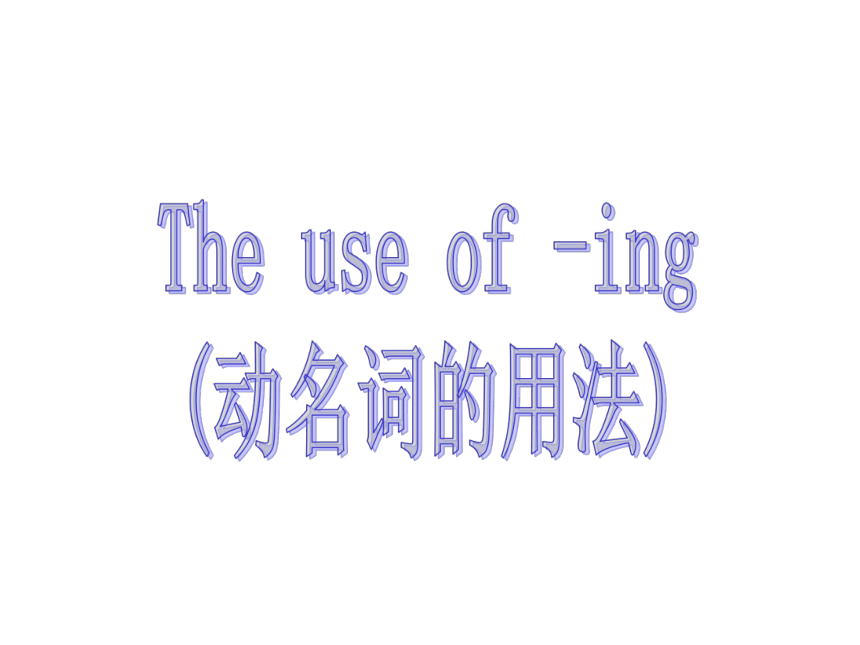
|
|
| 格式 | zip | ||
| 文件大小 | 402.8KB | ||
| 资源类型 | 教案 | ||
| 版本资源 | 人教版(新课程标准) | ||
| 科目 | 英语 | ||
| 更新时间 | 2019-11-30 00:00:00 | ||
图片预览

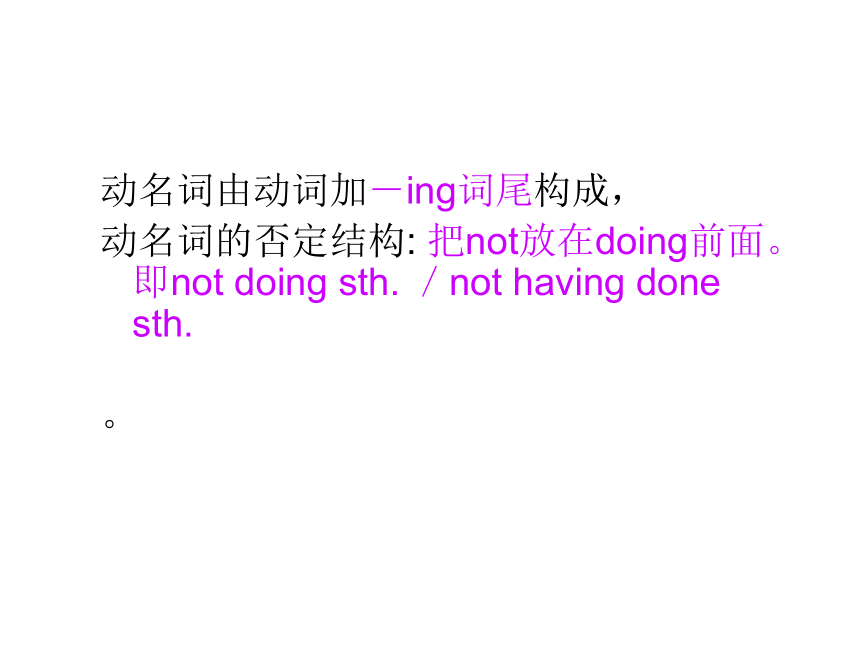
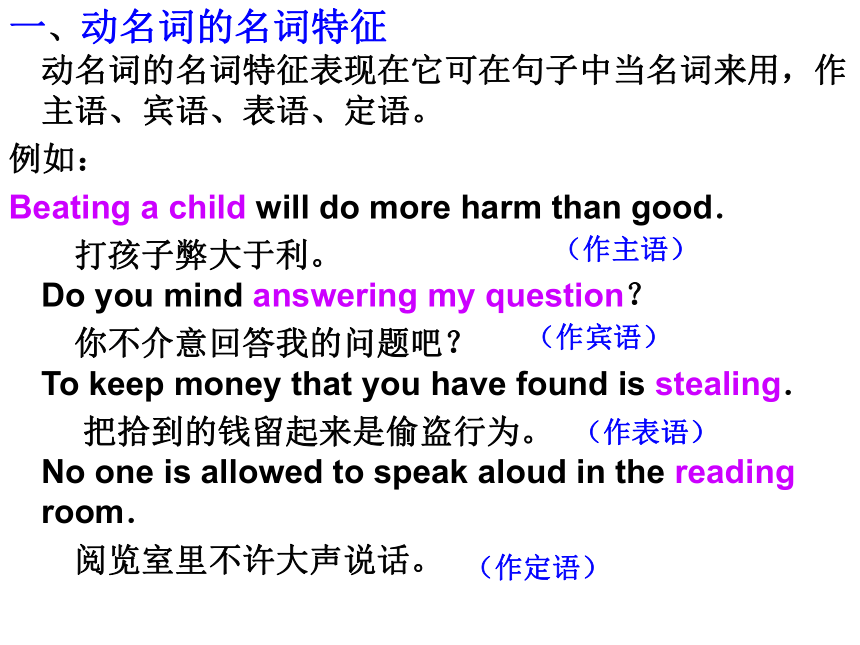
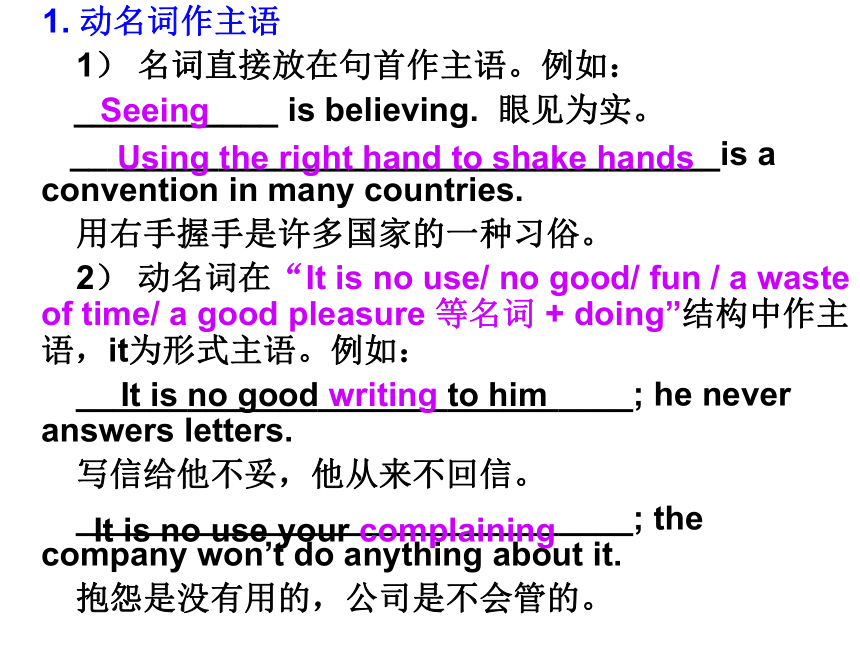
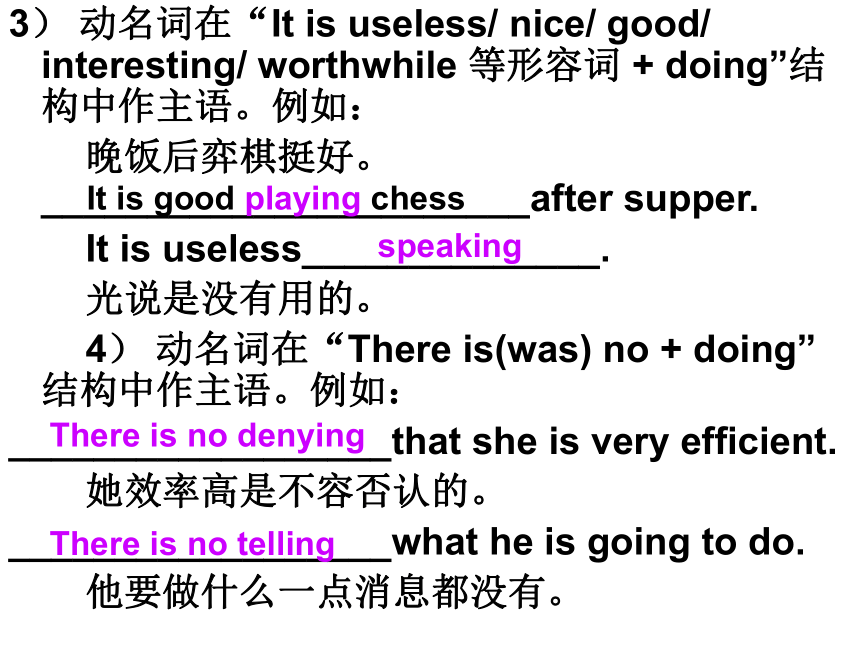
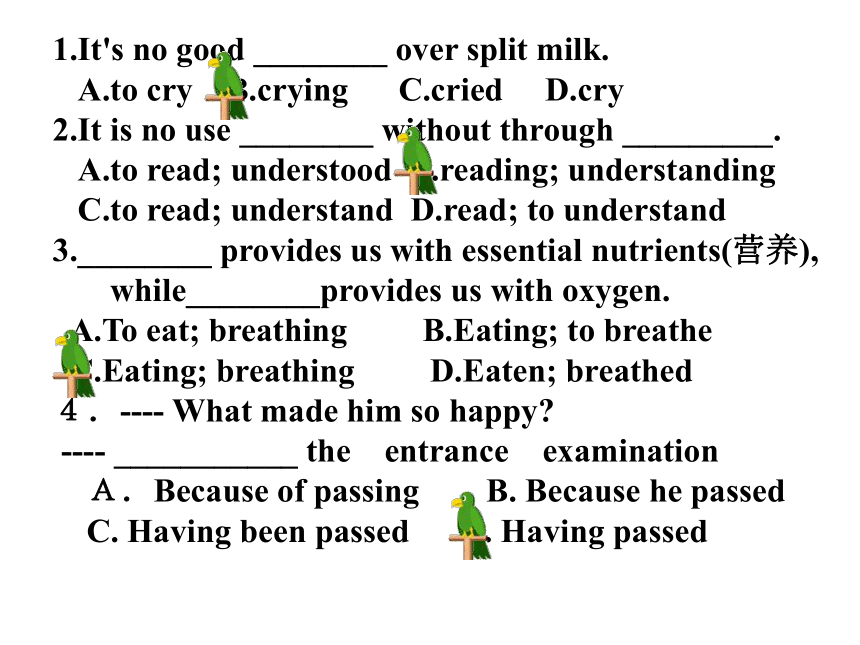
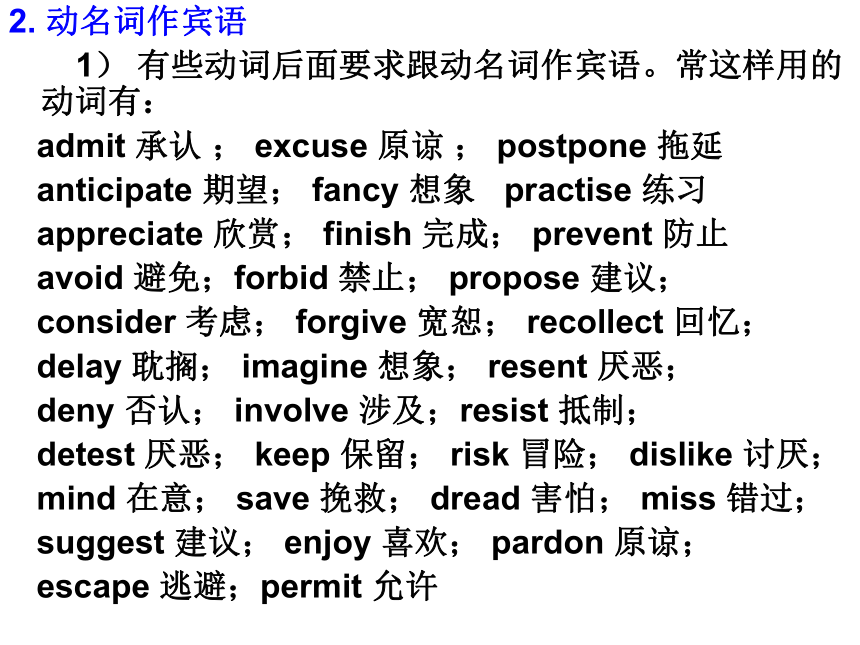
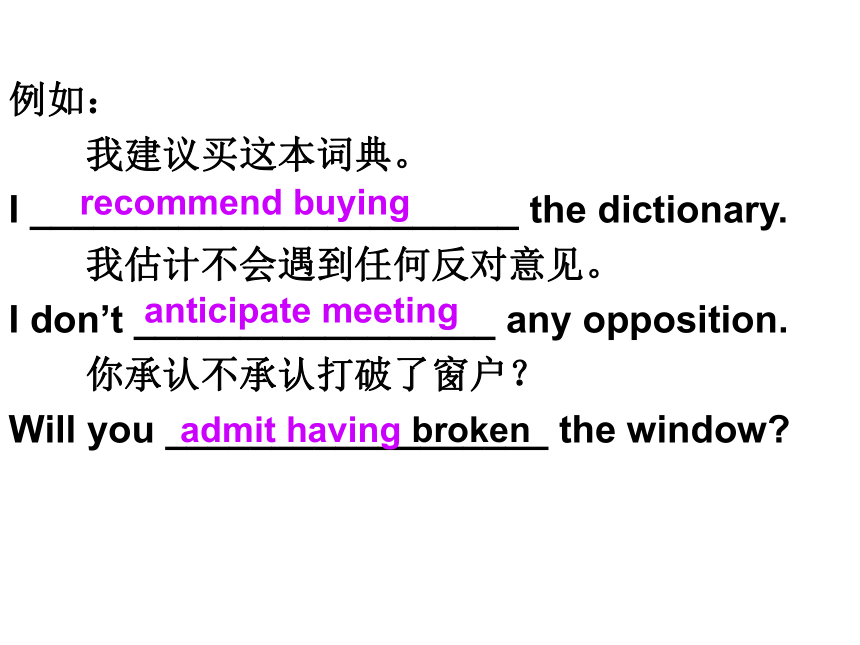
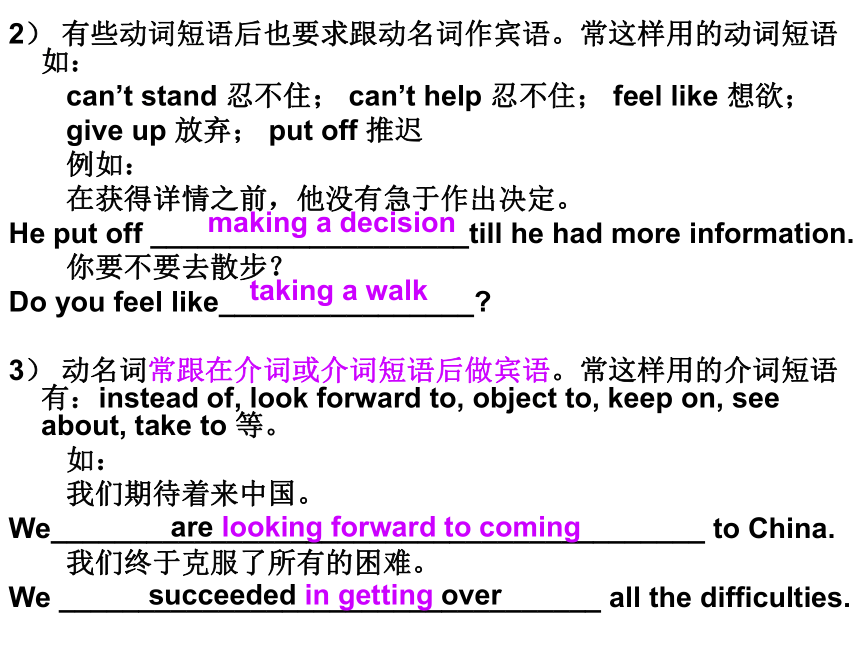
文档简介
课件29张PPT。The use of -ing
(动名词的用法)动名词由动词加-ing词尾构成,
动名词的否定结构: 把not放在doing前面。即not doing sth. /not having done sth.
。 一、动名词的名词特征 动名词的名词特征表现在它可在句子中当名词来用,作主语、宾语、表语、定语。
例如:
Beating a child will do more harm than good.
打孩子弊大于利。 Do you mind answering my question?
你不介意回答我的问题吧? To keep money that you have found is stealing.
把拾到的钱留起来是偷盗行为。 No one is allowed to speak aloud in the reading room.
阅览室里不许大声说话。(作主语)(作宾语)(作表语)(作定语) 1. 动名词作主语
1) 名词直接放在句首作主语。例如:
___________ is believing. 眼见为实。
___________________________________is a convention in many countries.
用右手握手是许多国家的一种习俗。
2) 动名词在“It is no use/ no good/ fun / a waste of time/ a good pleasure 等名词 + doing”结构中作主语,it为形式主语。例如:
______________________________; he never answers letters.
写信给他不妥,他从来不回信。
______________________________; the company won’t do anything about it.
抱怨是没有用的,公司是不会管的。SeeingUsing the right hand to shake handsIt is no good writing to himIt is no use your complaining3) 动名词在“It is useless/ nice/ good/ interesting/ worthwhile 等形容词 + doing”结构中作主语。例如:
晚饭后弈棋挺好。 _______________________after supper.
It is useless______________.
光说是没有用的。
4) 动名词在“There is(was) no + doing”结构中作主语。例如:
__________________that she is very efficient.
她效率高是不容否认的。
__________________what he is going to do.
他要做什么一点消息都没有。It is good playing chessspeakingThere is no denyingThere is no telling1.It's no good ________ over split milk.
A.to cry B.crying C.cried D.cry
2.It is no use ________ without through _________.
A.to read; understood B.reading; understanding
C.to read; understand D.read; to understand
3.________ provides us with essential nutrients(营养), while________provides us with oxygen.
A.To eat; breathing B.Eating; to breathe
C.Eating; breathing D.Eaten; breathed
4.---- What made him so happy?
---- ___________ the entrance examination
A.Because of passing B. Because he passed
C. Having been passed D. Having passed
2. 动名词作宾语
1) 有些动词后面要求跟动名词作宾语。常这样用的动词有:
admit 承认 ; excuse 原谅 ; postpone 拖延
anticipate 期望; fancy 想象 practise 练习
appreciate 欣赏; finish 完成; prevent 防止
avoid 避免;forbid 禁止; propose 建议;
consider 考虑; forgive 宽恕; recollect 回忆;
delay 耽搁; imagine 想象; resent 厌恶;
deny 否认; involve 涉及;resist 抵制;
detest 厌恶; keep 保留; risk 冒险; dislike 讨厌;
mind 在意; save 挽救; dread 害怕; miss 错过;
suggest 建议; enjoy 喜欢; pardon 原谅;
escape 逃避;permit 允许例如:
我建议买这本词典。
I _______________________ the dictionary.
我估计不会遇到任何反对意见。
I don’t _________________ any opposition.
你承认不承认打破了窗户?
Will you __________________ the window?
recommend buyinganticipate meetingadmit having broken2) 有些动词短语后也要求跟动名词作宾语。常这样用的动词短语如:
can’t stand 忍不住; can’t help 忍不住; feel like 想欲;
give up 放弃; put off 推迟
例如:
在获得详情之前,他没有急于作出决定。
He put off ____________________till he had more information.
你要不要去散步?
Do you feel like________________?
3) 动名词常跟在介词或介词短语后做宾语。常这样用的介词短语有:instead of, look forward to, object to, keep on, see about, take to 等。
如:
我们期待着来中国。
We_________________________________________ to China.
我们终于克服了所有的困难。
We __________________________________ all the difficulties.taking a walkmaking a decisionare looking forward to comingsucceeded in getting over 4) 在“have difficulty (trouble, problem, a hard time, fun, a good time) (+in) + 动名词;
be busy (in) + 动名词;
waste time (in) + 动名词;lost time (in) + 动名词;
There is no point (in) + 动名词”等结构中,动名词做介词宾语,in常要省去。
例如:
孩子们忙于做作业。
The children _________________ their homework.
再做一次这种简单的实验是毫无意义的。
________________________________the simple experiments once again.
are busy doingThere is no point (in) making1.— What caused the party to be put off?
? — _____ the invitations.
A. Tom delayed sendingB. Tom’s delaying sending
C. Tom delaying to send D. Tom delayed to send
2?I am busy _____ for the entrance examination, so I can’t help _____ housework at home.
A. preparing; doing B. preparing; to do
C. to prepare; doing D. to prepare; to do
3.He devoted his life to ________the atomic theory.
A.study B.be studied C.studying D.have studied
4.What worried the child most was __________ to visit his mother in the hospital.
A.his not allowing B. his not being allowed
C. his being allowed D. having not been allowed二、动名词可具有时态意义 动名词可以像动词那样表现时态意义,有一般式(doing)和完成式(having done)之分。动名词的时态意义是一个相对的概念,从属于句中谓语动词。
一般式表示动名词的动作与谓语动词的动作同时发生或在其后发生,或表示一般性动作,没有时间概念;
完成式表示动名词的动作在谓语动词的动作之前发生。
例如:
她为自己的美丽而骄傲。(同时) She is proud of (be)_____________________ .
我想下午去看工业展览。(在其后) I am thinking of (go) ___________________ the Industrial Exhibition this afternoon. being beautifulbeing beautiful 我为没能遵守诺言表示歉意。
I apologize for _______________ (keep) my promise.
(之前发生) 他因对国家做了这样大的贡献而受到表扬。
He was praised for ______________ (make) such a contribution to the country.
(之前发生) not having kepthaving made三、动名词可具有语态意义 如果动名词与句中的逻辑主语构成被动关系,即逻辑主语是接受动名词的动作,需用其被动形式(being done,having been done)。
其否定形式是:not being done, not having been done
例如:
他们无法忍受这样的待遇。
They couldn’t stand____________ (treat) like that.
(与其逻辑主语They构成被动关系,比较:They are treated like that.) being treated我听说他被选为那个队的教练。
I heard of his ___________________ (choose) to be the coach of the team.
(与其逻辑主语his构成被动关系,比较:
He was chosen to be the coach of the team.)having been chosen但是
1)在want,need,require,deserve等动词之后作宾语时,常用动名词的主动式表示被动意义,但如果用不定式则用被动式。
例如: 花园里的花需要浇水了。
The flowers in the garden want __________.
(比较:
The flowers in the garden want to be watered.)
那是一个那种真的不需回答的问题。
That’s one of those questions that really don’t need ____________.
(比较:
The questions don’t need to be answered.)wateringanswering2) 在(be)worth后面只能用动名词的主动态来表示被动意义。
例如:
他的提议值得考虑
His suggestion is worth (consider)__________.
此句可转换成:
His suggestion is worthy__________________.
consideringto be considered 3) allow, advise, forbid, permit等动词后直接跟所有格及动词作宾语时,要用V-ing形式;如果后面有名词或代词作宾语,然后再跟宾语补足语(即构成复合宾语),其宾语补足语用带to的不定式。
我不允许他在此地游泳。
I don’t allow him ____________________ here.
I don’t allow his ___________________ here.to swimswimming1.Some foods are eaten without ________.
A. well absorbing(吸收 )
B. being well absorbed
C. absorbing
D .well absorbed
2.Articles(物品) used by patients must be disinfected(消毒) before ________ others.
A. using B. being used by
C. used by D. being using
3.He attended the party without _______.
A. invited B. inviting
C. having invited D. being invited
4.Bebecca was unhappy for _____ the first chance to go abroad.
A. not having been given
B. not having given
C. not giving
D. having been given5.By _____, water can be changed into gas.
A.heating B.being heated
C.having heated D.heated
6.The classroom wants __________.
A. clean B.cleaned C.to clean D.cleaning
7.Though it sounds a bit too dear(昂贵),it is worth _________.
A. being bought B. buying
C. to buy D. buying it
8.This X-ray machine needs_________.
A. repairing B. to repair
C. repaired D. being repaired
9.The officers narrowly escaped ________??in the hot battle. A. have killed???????B. to kill??????
C. to be killed????????????? D. being killed 10.— Did you enjoy yourself last night?
?— It’s very nice of you. I appreciated _____ to the party.
A. to be invited B. to have invited
C. being invited D. having been invited
11.While we’re developing agriculture and industry, we must prevent the earth _____.
?A. from polluting B. polluted????
C. polluting D. being polluted12.Do you mind ___ alone at home?
A. Jane leaving
B. Jane having left
C. Jane’s being left
D. Jane to be left
13.How about the two of us ____ a walk down the garden?
A. To take B. take
C. taking D. to be taking四、动名词可带有自己的逻辑主语 一般情况下,动名词的逻辑主语可泛指任何人或与句中主语一致。例如: 但出于句意表达的需要,动名词常常带有自己的逻辑主语。动名词自己带的逻辑主语有两种形式:
a)在动名词前加“物主代词或名词的所有格”;
b)在动名词前加“名词的普通格或人称代词的宾格”。
两者的区别是:前者为正式语体,后者多用于非正式语体,多见于口语和动名词位于句中时。因此,在书面文体中,尽量用前者,不用后者;但在口语中使用后者更为自然。例如:
你介意我在室内吸烟吗?
Do you mind (smoke)__________________in the room?
我不记得我母亲抱怨过。
I don’t remember(complain)_____________________ .
我反对他为私事使用办公室电话。
I object to(make)____________________ private calls on the office phone.my smokingmy mother complaininghim making______? ?ill worried my parents greatly. A. I fell??????????? B. Me falling ???????
C. My falling??????? D. I falling
2. I would appreciate ______ back this afternoon. (NET 1992)
A.you to call B.you call
C.you calling D.you’re calling其他情况1.go without saying表示不用说、毫无疑义或不成问题。
还用得着说,你什么时候来看我都欢迎。
It goes without saying that you're welcome to visit me at any time.2).No+动名词用于表示禁止或不准的简短命令或法规,其后不可接受词。
No parking! No smoking!?
禁止吸烟! 禁止泊车!Ex.1 P22
being attacked
being held up
being included
being accepted
being told
being helped out
being taken
being photographed
being swallowed
being thrown about
Ex.1 P64
being invited
being kept waiting
being attacked
being award
being shouted at
being to blamedEx.2
1.had been cancelled
2.could have been made by Ben
3.were taken to the beach and
introduced to some of their friends by
the hosts.
4.are tended to be produced by dirty
living conditions.
5. is being used as a car park
6.was seen entering the house with knives
(动名词的用法)动名词由动词加-ing词尾构成,
动名词的否定结构: 把not放在doing前面。即not doing sth. /not having done sth.
。 一、动名词的名词特征 动名词的名词特征表现在它可在句子中当名词来用,作主语、宾语、表语、定语。
例如:
Beating a child will do more harm than good.
打孩子弊大于利。 Do you mind answering my question?
你不介意回答我的问题吧? To keep money that you have found is stealing.
把拾到的钱留起来是偷盗行为。 No one is allowed to speak aloud in the reading room.
阅览室里不许大声说话。(作主语)(作宾语)(作表语)(作定语) 1. 动名词作主语
1) 名词直接放在句首作主语。例如:
___________ is believing. 眼见为实。
___________________________________is a convention in many countries.
用右手握手是许多国家的一种习俗。
2) 动名词在“It is no use/ no good/ fun / a waste of time/ a good pleasure 等名词 + doing”结构中作主语,it为形式主语。例如:
______________________________; he never answers letters.
写信给他不妥,他从来不回信。
______________________________; the company won’t do anything about it.
抱怨是没有用的,公司是不会管的。SeeingUsing the right hand to shake handsIt is no good writing to himIt is no use your complaining3) 动名词在“It is useless/ nice/ good/ interesting/ worthwhile 等形容词 + doing”结构中作主语。例如:
晚饭后弈棋挺好。 _______________________after supper.
It is useless______________.
光说是没有用的。
4) 动名词在“There is(was) no + doing”结构中作主语。例如:
__________________that she is very efficient.
她效率高是不容否认的。
__________________what he is going to do.
他要做什么一点消息都没有。It is good playing chessspeakingThere is no denyingThere is no telling1.It's no good ________ over split milk.
A.to cry B.crying C.cried D.cry
2.It is no use ________ without through _________.
A.to read; understood B.reading; understanding
C.to read; understand D.read; to understand
3.________ provides us with essential nutrients(营养), while________provides us with oxygen.
A.To eat; breathing B.Eating; to breathe
C.Eating; breathing D.Eaten; breathed
4.---- What made him so happy?
---- ___________ the entrance examination
A.Because of passing B. Because he passed
C. Having been passed D. Having passed
2. 动名词作宾语
1) 有些动词后面要求跟动名词作宾语。常这样用的动词有:
admit 承认 ; excuse 原谅 ; postpone 拖延
anticipate 期望; fancy 想象 practise 练习
appreciate 欣赏; finish 完成; prevent 防止
avoid 避免;forbid 禁止; propose 建议;
consider 考虑; forgive 宽恕; recollect 回忆;
delay 耽搁; imagine 想象; resent 厌恶;
deny 否认; involve 涉及;resist 抵制;
detest 厌恶; keep 保留; risk 冒险; dislike 讨厌;
mind 在意; save 挽救; dread 害怕; miss 错过;
suggest 建议; enjoy 喜欢; pardon 原谅;
escape 逃避;permit 允许例如:
我建议买这本词典。
I _______________________ the dictionary.
我估计不会遇到任何反对意见。
I don’t _________________ any opposition.
你承认不承认打破了窗户?
Will you __________________ the window?
recommend buyinganticipate meetingadmit having broken2) 有些动词短语后也要求跟动名词作宾语。常这样用的动词短语如:
can’t stand 忍不住; can’t help 忍不住; feel like 想欲;
give up 放弃; put off 推迟
例如:
在获得详情之前,他没有急于作出决定。
He put off ____________________till he had more information.
你要不要去散步?
Do you feel like________________?
3) 动名词常跟在介词或介词短语后做宾语。常这样用的介词短语有:instead of, look forward to, object to, keep on, see about, take to 等。
如:
我们期待着来中国。
We_________________________________________ to China.
我们终于克服了所有的困难。
We __________________________________ all the difficulties.taking a walkmaking a decisionare looking forward to comingsucceeded in getting over 4) 在“have difficulty (trouble, problem, a hard time, fun, a good time) (+in) + 动名词;
be busy (in) + 动名词;
waste time (in) + 动名词;lost time (in) + 动名词;
There is no point (in) + 动名词”等结构中,动名词做介词宾语,in常要省去。
例如:
孩子们忙于做作业。
The children _________________ their homework.
再做一次这种简单的实验是毫无意义的。
________________________________the simple experiments once again.
are busy doingThere is no point (in) making1.— What caused the party to be put off?
? — _____ the invitations.
A. Tom delayed sendingB. Tom’s delaying sending
C. Tom delaying to send D. Tom delayed to send
2?I am busy _____ for the entrance examination, so I can’t help _____ housework at home.
A. preparing; doing B. preparing; to do
C. to prepare; doing D. to prepare; to do
3.He devoted his life to ________the atomic theory.
A.study B.be studied C.studying D.have studied
4.What worried the child most was __________ to visit his mother in the hospital.
A.his not allowing B. his not being allowed
C. his being allowed D. having not been allowed二、动名词可具有时态意义 动名词可以像动词那样表现时态意义,有一般式(doing)和完成式(having done)之分。动名词的时态意义是一个相对的概念,从属于句中谓语动词。
一般式表示动名词的动作与谓语动词的动作同时发生或在其后发生,或表示一般性动作,没有时间概念;
完成式表示动名词的动作在谓语动词的动作之前发生。
例如:
她为自己的美丽而骄傲。(同时) She is proud of (be)_____________________ .
我想下午去看工业展览。(在其后) I am thinking of (go) ___________________ the Industrial Exhibition this afternoon. being beautifulbeing beautiful 我为没能遵守诺言表示歉意。
I apologize for _______________ (keep) my promise.
(之前发生) 他因对国家做了这样大的贡献而受到表扬。
He was praised for ______________ (make) such a contribution to the country.
(之前发生) not having kepthaving made三、动名词可具有语态意义 如果动名词与句中的逻辑主语构成被动关系,即逻辑主语是接受动名词的动作,需用其被动形式(being done,having been done)。
其否定形式是:not being done, not having been done
例如:
他们无法忍受这样的待遇。
They couldn’t stand____________ (treat) like that.
(与其逻辑主语They构成被动关系,比较:They are treated like that.) being treated我听说他被选为那个队的教练。
I heard of his ___________________ (choose) to be the coach of the team.
(与其逻辑主语his构成被动关系,比较:
He was chosen to be the coach of the team.)having been chosen但是
1)在want,need,require,deserve等动词之后作宾语时,常用动名词的主动式表示被动意义,但如果用不定式则用被动式。
例如: 花园里的花需要浇水了。
The flowers in the garden want __________.
(比较:
The flowers in the garden want to be watered.)
那是一个那种真的不需回答的问题。
That’s one of those questions that really don’t need ____________.
(比较:
The questions don’t need to be answered.)wateringanswering2) 在(be)worth后面只能用动名词的主动态来表示被动意义。
例如:
他的提议值得考虑
His suggestion is worth (consider)__________.
此句可转换成:
His suggestion is worthy__________________.
consideringto be considered 3) allow, advise, forbid, permit等动词后直接跟所有格及动词作宾语时,要用V-ing形式;如果后面有名词或代词作宾语,然后再跟宾语补足语(即构成复合宾语),其宾语补足语用带to的不定式。
我不允许他在此地游泳。
I don’t allow him ____________________ here.
I don’t allow his ___________________ here.to swimswimming1.Some foods are eaten without ________.
A. well absorbing(吸收 )
B. being well absorbed
C. absorbing
D .well absorbed
2.Articles(物品) used by patients must be disinfected(消毒) before ________ others.
A. using B. being used by
C. used by D. being using
3.He attended the party without _______.
A. invited B. inviting
C. having invited D. being invited
4.Bebecca was unhappy for _____ the first chance to go abroad.
A. not having been given
B. not having given
C. not giving
D. having been given5.By _____, water can be changed into gas.
A.heating B.being heated
C.having heated D.heated
6.The classroom wants __________.
A. clean B.cleaned C.to clean D.cleaning
7.Though it sounds a bit too dear(昂贵),it is worth _________.
A. being bought B. buying
C. to buy D. buying it
8.This X-ray machine needs_________.
A. repairing B. to repair
C. repaired D. being repaired
9.The officers narrowly escaped ________??in the hot battle. A. have killed???????B. to kill??????
C. to be killed????????????? D. being killed 10.— Did you enjoy yourself last night?
?— It’s very nice of you. I appreciated _____ to the party.
A. to be invited B. to have invited
C. being invited D. having been invited
11.While we’re developing agriculture and industry, we must prevent the earth _____.
?A. from polluting B. polluted????
C. polluting D. being polluted12.Do you mind ___ alone at home?
A. Jane leaving
B. Jane having left
C. Jane’s being left
D. Jane to be left
13.How about the two of us ____ a walk down the garden?
A. To take B. take
C. taking D. to be taking四、动名词可带有自己的逻辑主语 一般情况下,动名词的逻辑主语可泛指任何人或与句中主语一致。例如: 但出于句意表达的需要,动名词常常带有自己的逻辑主语。动名词自己带的逻辑主语有两种形式:
a)在动名词前加“物主代词或名词的所有格”;
b)在动名词前加“名词的普通格或人称代词的宾格”。
两者的区别是:前者为正式语体,后者多用于非正式语体,多见于口语和动名词位于句中时。因此,在书面文体中,尽量用前者,不用后者;但在口语中使用后者更为自然。例如:
你介意我在室内吸烟吗?
Do you mind (smoke)__________________in the room?
我不记得我母亲抱怨过。
I don’t remember(complain)_____________________ .
我反对他为私事使用办公室电话。
I object to(make)____________________ private calls on the office phone.my smokingmy mother complaininghim making______? ?ill worried my parents greatly. A. I fell??????????? B. Me falling ???????
C. My falling??????? D. I falling
2. I would appreciate ______ back this afternoon. (NET 1992)
A.you to call B.you call
C.you calling D.you’re calling其他情况1.go without saying表示不用说、毫无疑义或不成问题。
还用得着说,你什么时候来看我都欢迎。
It goes without saying that you're welcome to visit me at any time.2).No+动名词用于表示禁止或不准的简短命令或法规,其后不可接受词。
No parking! No smoking!?
禁止吸烟! 禁止泊车!Ex.1 P22
being attacked
being held up
being included
being accepted
being told
being helped out
being taken
being photographed
being swallowed
being thrown about
Ex.1 P64
being invited
being kept waiting
being attacked
being award
being shouted at
being to blamedEx.2
1.had been cancelled
2.could have been made by Ben
3.were taken to the beach and
introduced to some of their friends by
the hosts.
4.are tended to be produced by dirty
living conditions.
5. is being used as a car park
6.was seen entering the house with knives
